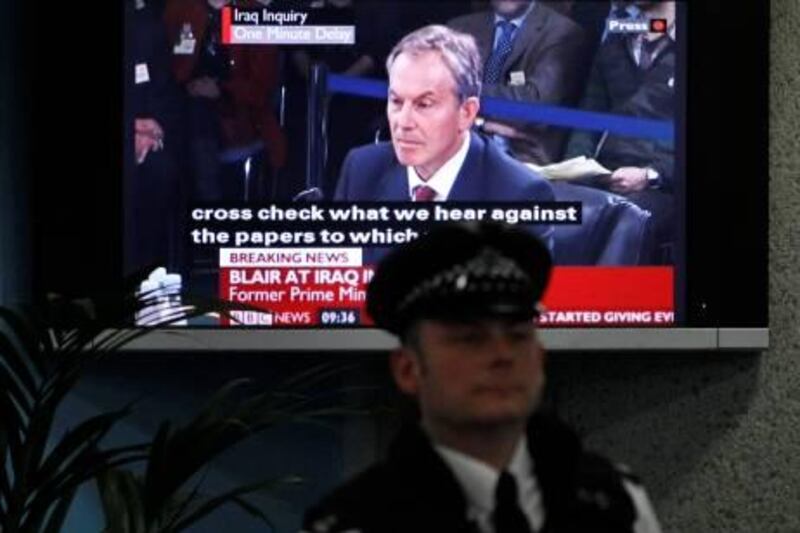LONDON // Britain's top civil servant has blocked plans to publish messages sent by the then-prime minister Tony Blair to George W Bush in the months leading up to the invasion of Iraq.
The government-ordered inquiry in London into the events before, during and after the invasion of 2003 had wanted to publish extracts from the letters, saying they were "essential" to understanding what had happened.
But the head of the civil service, the Cabinet secretary, Sir Gus O'Donnell, has now refused the request to declassify the messages in a move that has clearly annoyed Sir John Chilcot, the inquiry's chairman.
Sir Gus, who will give evidence to the inquiry next week, has ruled that "the public interest is not best served" by declassifying the letters.
"I judge that their release would, or would be likely to, damage the UK’s international relations," he told Sir John in a letter, adding that the Cabinet Office attached "particular importance" to protecting the channel of communications between the British prime minister and the US president.
However, a clearer idea of the commitments and support Mr Blair was giving the then-US president Bush in the run-up to the war might well emerge tomorrow when Mr Blair is recalled by the inquiry to give evidence for a second time.
The five members of the inquiry are expected to paraphrase the personal pledges Mr Blair gave to Mr Bush in their questions to him.
Alastair Campbell, the former communications director in Downing Street and one of Mr Blair's closest aides, has already told the inquiry that the secret messages, some of them handwritten, had assured Mr Bush in the year before the invasion that Britain would back any military action taken by the US.
Mr Campbell told the inquiry last year that the letters were "very frank", adding: "The tenor of them was that we are absolutely with you in making Saddam face up to his obligations.
"But if that can't be done diplomatically, if it has to be done militarily, then Britain will be there."
These assurances appear to have been made even though Mr Blair's legal advisers were telling him that an invasion of Iraq would not be lawful without a new UN resolution expressly backing it.
Sir John wrote to the Cabinet Secretary last month saying that the inquiry's terms of reference supported public disclosure of the messages, which the inquiry members have already read.
The chairman pointed out that some of the details in the messages had already been disclosed in recently published memoirs by Mr Blair, Mr Bush, Mr Campbell and Jonathan Powell, the former prime minister's chief of staff.
"The inquiry regards it essential in order to fulfil its terms of reference, to be able to chronicle the sequencing of discussions on Iraq between the UK prime minister and the president of the United States," Sir John wrote.
In a subsequent letter, he said: "The material requested provides important, and often unique, insights into Mr Blair's thinking and the commitments he made to President Bush, which are not reflected in other papers.
"The question when and how the prime minister made commitments to the US about the UK's involvement in military action in Iraq and subsequent decisions on the UK's continuing involvement, is central to its considerations". The Cabinet Office later indicated that Sir Gus had consulted Mr Blair before deciding to block the documents' release.
"There is an established convention covering papers of a previous administration whereby former ministers would normally be consulted before release of papers from their time in government," said a Cabinet Office spokeswoman.
When the inquiry resumed its hearings on Tuesday, Sir John said the inquiry members were disappointed that their request was denied.
"This means that in a narrow but important area the inquiry may not always be able to publish as fully as it would wish the evidential basis for some of its comments and conclusions," he said.
A spokesman for David Cameron, the current prime minister, said yesterday that he had not been consulted over the release of the letters.
The inquiry, which is examining mistakes made in the build-up to and aftermath of the US-led invasion, will not apportion blame or assign criminal liability, but will report next year with recommendations for future conflicts.






